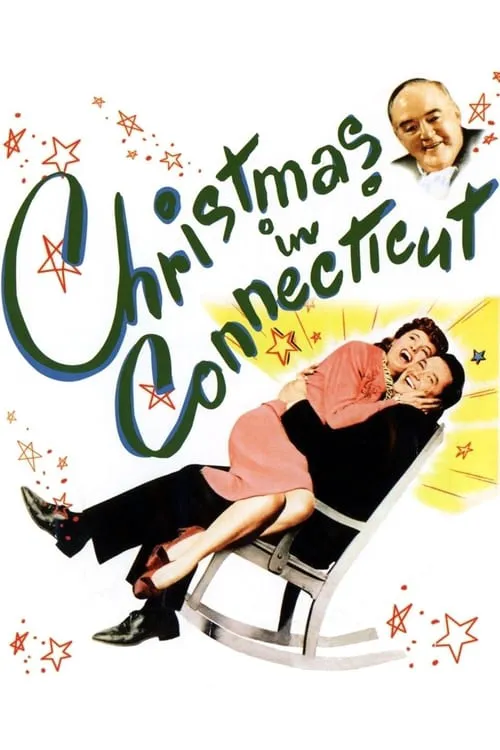Christmas in Connecticut

Plot
In the 1945 romantic comedy "Christmas in Connecticut," Elizabeth Lane, played by Barbara Stanwyck, is a talented but desperate food writer for a prominent women's magazine. Her life appears to be a perfect blend of domesticity and charm as she pens the popular column, "The Diary of a Housewife," under a pseudonym. Behind the scenes, however, her situation is far from idyllic. Elizabeth's column is largely fabricated, and her true circumstances are a far cry from the idyllic farm setting she describes to her readers. The main character, Elizabeth Lane, lives a solitary life, often at odds with her editor, Dudley Beecham, who struggles to keep up her fictional persona. Her publisher, Alexander Yardley, and her editor are equally concerned that Elizabeth's deception will eventually be discovered and their careers will suffer as a result. Meanwhile, war hero Jefferson Jones, played by Dennis Morgan, is recovering in a hospital from his injuries sustained during the war. Elizabeth's "Diary of a Housewife" column becomes one of the few sources of comfort for Jefferson, and he develops a strong admiration for the homemaker he imagines Elizabeth to be. Jefferson's nurse, recognizing the positive effect that Elizabeth's writings have had on the wounded soldier, arranges for him to spend the holiday with the enigmatic writer at her picturesque farm in Connecticut. The idea is to provide Jefferson with the kind of warm, comforting atmosphere that Elizabeth writes about in her column. Elizabeth, however, is faced with this predicament after a frantic meeting with her editor and publisher. Her farm home is little more than a rural plot on the edge of town, and neither her husband, nor her son exists. With her job under scrutiny and her reputation at stake, Elizabeth is forced to improvise and quickly devise a way to transform her modest living space into the cozy farmhouse she writes about. As Christmas draws near, Elizabeth enlists the help of her assistant to set up a picturesque country scene on her farm. They hastily decorate the house, buy fake holly, and arrange for a turkey to be cooked for what she tells her readers would be the perfect country Christmas. This farce of a country setting is, however, quickly unraveled by Jeff, who is far more down to earth than Elizabeth anticipated. Upon Jeff's arrival, Elizabeth is faced with the daunting task of trying to maintain the illusion that she is the quintessential American housewife, complete with a loving husband and child. As they begin to spend more time together, Elizabeth finds herself drawn to the charming war hero and starts to see beyond her fabricated persona. The tension between her genuine emotions and her fictional portrayal creates an intriguing dynamic. Jeff, too, is intrigued by Elizabeth's dual identity and the apparent disconnect between her words and her true self. He is torn between his admiration for her talent and the sense of authenticity he craves after experiencing the harsh realities of war. As Christmas Eve falls, Jeff invites Elizabeth to join him in his favorite pastime, reading from the classics. For the first time in the film, Elizabeth appears in all her true colors, revealing a wit and charm that is as unexpected as it is captivating. This quiet moment between the characters sparks a series of conversations that begin to dismantle the façade of Elizabeth's fabricated life. As they share the story of their relationship with the "Diary of a Housewife," they start to break down the walls of expectation and the carefully crafted illusion of domesticity. In an unexpected twist, Elizabeth and Jeff discover that they have much more in common than initially meets the eye. Both characters have used their talents to convey a reality that isn't entirely authentic. While Jeff presents himself as a war hero, Elizabeth has crafted an idyllic home life that bears little resemblance to reality. As Christmas dawns, Jeff and Elizabeth share a heartwarming moment, where Jefferson finally comes clean and reveals his initial expectations of Elizabeth's column are dispelled. Together, they begin to realize the power of authenticity, the importance of genuine emotions, and the beauty of the imperfect lives we all lead. In the final act of the film, Elizabeth finds the courage to speak out against the expectations of her editors and the artificial persona she's been living. By doing so, she creates the kind of domestic reality she initially promised her readers – with a twist of her own. It is here, surrounded by the quiet moments and genuine connections she's formed with Jeff, that Elizabeth finds true happiness. The film ends on a hopeful note, leaving the viewer to ponder the value of authenticity in the most mundane of domestic routines.
Reviews
Recommendations




